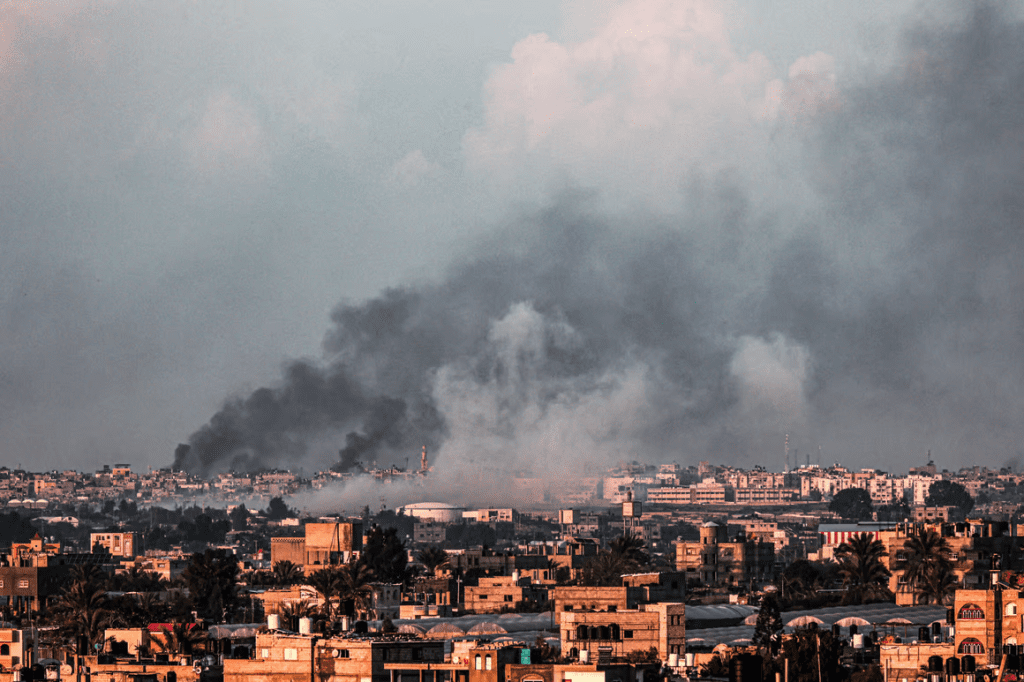The escalation comes days after peace talks designed to end the war in Gaza.

Fears are growing among Palestinians that Israeli Prime Minister Benjamin Netanyahu will take advantage of the situation to invade the Gazan border city of Rafah. | Said Khatib/AFP via Getty Images
Even if Israel avoids all-out war with Iran after Saturday’s attack by Tehran, fears are growing among Palestinians that Israeli Prime Minister Benjamin Netanyahu will take advantage of the situation to invade the Gazan border city of Rafah.
The U.S. has been pressing Netanyahu to hold back in Rafah — sensing a potential humanitarian catastrophe in the city bordering Egypt where as many as 1.5 million people are sheltering — but the overnight assault is likely to harden the Israeli prime minister’s stance on crushing Iran-backed Hamas.
“Many are making the point that, in exchange for Israel not responding directly to Iran, the U.S. will sign off on an Israeli ground operation in Rafah,” said Mouin Rabbani, a Palestinian scholar and founder of the Jadaliyya news site.
“There are some Palestinians who will say ‘Finally, someone has attacked Israel’ and hope that others will follow,” he added. “But some will be very concerned that the conflict between Israel and Iran overshadows the attack on the Gaza Strip and will provide renewed support for Israel.”
Iran’s attack, a response to an Israeli strike on its embassy in Syria that killed two senior military commanders, could have profound implications for Palestinians in a conflict that has already killed over 30,000 of them and displaced 1.7 million more.
Israel vowed “a significant response” to the bombardment on Sunday, which saw its Iron Dome air defense system and U.S. fighter jets shoot down almost all of the over 300 incoming projectiles.

“The Israelis could pocket this and try to react at the right time and the right place,” said Ahron Bregman, a war studies lecturer at King’s College London. “Or they could listen to those who want to try and deteriorate the situation, saying now is the time to, for example, strike Iran’s nuclear facilities.”
However, few of Israel’s own allies want to see direct attacks on Iranian territory, which Tehran has claimed would trigger fierce retaliation. According to White House spokesman John Kirby, while Israel has the right to respond, “the president’s been very clear: we don’t seek a war with Iran.” Behind the scenes though, Washington is understood to have warned Israel not to escalate the conflict further with a disproportionate reaction against Tehran. But Israel has a wide choice of other Iran-linked targets closer to home it could aim for that are unlikely to have the same consequences.
Hours after the barrage, Israel struck a site deep inside neighbouring Lebanon that it says was used by Hezbollah, the Tehran-backed paramilitary group that has been using the country as a launch pad from which fire rockets across the border into Israel. Now, concern is growing that it could again step up its offensive in Gaza against Iran’s ally Hamas as well, just as speculation was growing that both sides were looking for an off-ramp after six months of brutal conflict.
Gaza’s southern city of Rafah is the last part of the territory that hasn’t been militarily occupied, and is where hundreds of thousands of Palestinians displaced from their homes are sheltering. The U.S., along with the EU, the U.K. and the U.N., has warned Israel against an assault that could “put the final nail in the coffin” of what is already a major humanitarian crisis. However, with Netanyahu casting the conflict as a battle against Hamas as an Iranian proxy, Tehran’s attacks may give him a freer hand.
“There are two scenarios: one is that American decision-makers realize that Netanyahu and his war cabinet are pulling NATO into a regional war with Iran, which is not in the interests of the U.S. or EU, and double down with massive pressure on Netanyahu to force a ceasefire in Gaza,” said Fadi Quran, a member of the Al-Shabaka Palestinian policy network. “The second scenario is that Netanyahu’s gamble with a regional war succeeds and Western leaders are cornered into allowing Israel to continue using starvation as a tactic in Gaza, attack Rafah and pull the region closer to the abyss.”
Just last week, the Israel Defense Forces announced they were drawing down the number of troops in Gaza to only one brigade. While it publicly said the move was to enable its soldiers to resupply and train ahead of an invasion of Rafah, the international opposition led to speculation it could be a precursor to a ceasefire. At the same time, Qatari negotiatiors, who have been brokering talks between Israel and Hamas, said they were optimistic about the prospect of a deal being done to end — or at least pause — the violence, with Washington piling on the pressure despite Hamas’ rejection of key terms.
However, according to Daniel Davis, a retired U.S. army lieutenant colonel and senior fellow at Defense Priorities, provoking Iran into undercutting the prospects of a ceasefire could be a deliberate strategy. “The only reason this is an issue is because Israel chose to assassinate a general in the Iranian embassy in Damascus,” he said. “They chose the most volatile, in-your-face target they could, I think, to spawn something.”
Source: Politico



